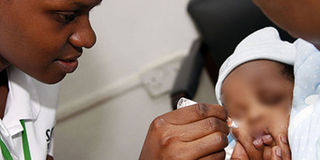Prime
Govt confirms polio outbreak in Uganda

A child is immunised against polio. The Ministry of Health has resolved to scale up immunisation following detection of polio viruses in Kampala. PHOTO/ FILE
What you need to know:
- The polio viruses were found in two samples collected from the sewage plants of Bugolobi and Lubigi in Kampala.
The Ministry of Health has confirmed a polio outbreak in the country. The polio viruses were established on July 21 from two samples collected on June 1 from the sewage plants of Bugolobi and Lubigi in Kampala.
“The results confirmed a circulating Vaccine Derived Polio Virus Type 2 in Uganda. The virus sequencing test done in South Africa on the two samples showed that the confirmed circulating Vaccine Derived Polio Virus is linked to a circulating cVDPV2 lineage in Sudan,” Dr Henry Mwebesa, the director general of Health Services, noted in an August 12 statement.
He said the virus is classified as an orphan with 28 changes from the closest match of mutants, meaning it is likely to have been circulating in the country for two years.
Such undetected transmission suggests there are gaps in the national polio surveillance sensitivity that need to be identified and corrected urgently.
“This confirmation comes as no surprise; there has been an ongoing outbreak of Circulating Vaccine Derived Polio Viruses (cVDPV2) over the last two years in the African region,” Dr Mwebesa said.
Some of the African countries where the outbreak has been declared in the last 12 months include Benin, Burkina Faso, Cameroon, Central African Republic, Chad, Cote d’Ivoire and the Democratic Republic of Congo (DRC).
Others are Ethiopia, Guinea, Liberia, Madagascar, Mali, Niger, Nigeria, Senegal, Sierra Leone, South Sudan and The Gambia.
The ministry said poliomyelitis is caused by a group of three unrelated viruses called Wild Polio type 1, type 2 and type 3.
“Through regular mass polio campaigns, polio-viruses types 2 and 3 have been eradicated globally. The indigenous Wild Polio virus type 1 has been eradicated globally. The indigenous Wild Polio virus type 1 has been eradicated in Africa,” Dr Mwebesa said.
“When the world was declared free of the most virulent Wild polio virus type 2 in 2015, the vaccine against type two was withdrawn from routine immunisation in 2016, only leaving vaccines against types 1 and 3,” he added.
According to the statement, the current potential drivers of the outbreak and further spread are cVDPV2 outbreaks in the neighboring South Sudan and closest trading partners in Ethiopia, Somalia and Yemen, low mucosal immunity levels against type-2 polio, incessant cross-border movements and poor hand washing practices.
In response, the ministry said it has heightened its surveillance systems in all health facilities in the country and sentinel environmental surveillance sites in urban centres. Further, the Ministry of Local Government, district local governments and urban authorities have been urged to ensure that no single child misses out on routine vaccination services. Districts with international borders have been urged to revive cross-border collaborations aimed at enhancing the quality of polio surveillance.
The last indigenous wild polio virus in the country, according to the statement, was identified in 1997, and the country was certified free of all polio viruses in 2006. However, the country continues to be under threats of importation of all forms of the polio virus as was the case in 2009 and 2020 in the districts of Bugiri and Mayuge, leading to repeated 23 cycles of immunisation days for polio vaccinations.
What ministry resolved to do
• Declare and manage the outbreak as a national public health emergency of international concern.
• Ensure that all travellers from affected countries are screened and vaccinated against poliomyelitis.
• Interrupt transmission of cVDPVs outbreaks with 120 days of detention through Immunisation.
• Mass polio vaccination campaign using the stable and novel Oral Polio Vaccine (nOPV2) for all children under the age of five years.
•Strengthening surveillance and recovery



